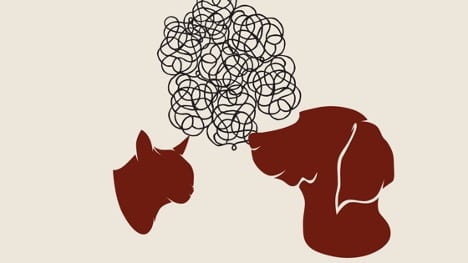
There has been a lot of concern recently about pets acquired during the Covid -19 pandemic and what will happen to them when their owners return to the office. Many veterinary behaviorists worry that the pets will begin to exhibit some negative behaviors such as separation anxiety because they will miss their owner’s constant Presence.
Making sure your dog or cat is properly prepared for your absence will help avert this issue. Make sure the pet has plenty of exercise and activity every day. Make multiple short trips out of the house and extend them longer and longer to acclimate the pet to being without you. Never make a “big deal” out of leaving because the pet will associate your motions, tone of voice and words with you leaving. Change your routines like leaving from a different door, not jingling keys, not taking a purse or even waiting to put on your coat when out of site. This will help your pet avoid becoming anxious about your departure.

However, going beyond separation anxiety behaviors, it is also possible that dogs exhibit compulsive behaviors similar to humans who have Obsessive Compulsive Disorder. We are all familiar with people who are OCD in varying degrees. Some may compulsively check locks, return to the kitchen to make sure their stove is off multiple times before leaving the home, or are afraid of touching objects that others have used because of germs. Some people even obsessively pick their hair or scratch their skin. In humans, obsessions lead to compulsive actions…like the germaphobe who washes their hands to the point of being raw.
When dogs exhibit compulsive behaviors, they too can damage their skin or even lick themselves until they are bald. According to animal behaviorists, compulsive disorders are caused by conflict, stress and/ or frustration. These behaviors typically get worse as the pets age. A dog will on occasion use a behavior such as holding a toy in its mouth to release neurotransmitters which calm a stressful event. When the behavior works as a calming agent the dog will repeat these behaviors until they become ritualized. Dogs will often begin to perform these compulsive behaviors with any stressful event, not just the one that originally caused them an issue. This is why over time these behaviors typically get worse. One of the most common signs we see are lick granulomas on the forearms. Dogs also obsessively lick their feet. Foot licking is a sign of allergies in dogs but when the allergies have been resolved or ruled out, then it is necessary to look further into these negative behaviors.
Some typical compulsive behaviors are chasing and biting the tail, running fence lines until the pads are possibly damaged, barking at certain objects obsessively. These behaviors can take over a dog’s life, interrupting sleep cycles and feeding habits. Dogs that chase their tails can often end up mutilating the tail even requiring amputation. Obviously, these behaviors are not only stressful to the dog but they are also stressful to the humans living with an animal with this disorder. Some dog breeds are predisposed to these compulsive behaviors. Bull Terriers and German Shepherds are commonly seen for tail-chasing. Labrador retrievers have oral compulsive behaviors such as picking up any object and eating it. Doberman Pinschers are known for flank sucking where the dog holds and sucks on the skin of the flank often causing infections. If you are concerned that your pet may have these behaviors or be predisposed to these behaviors you may talk to either of our veterinarians about your breed’s genetic predisposition.
If you suspect that your dog has a compulsive disorder the first thing to do is to make sure there are no medical reasons for these behaviors. Your dog should receive a complete physical examination and screening lab work. If your dog is deemed to be healthy and free of pain his compulsive disorder can be treated with medications to lower the arousal and behavior modifications to give him a better coping strategy. This is not a short-term fix as treatment is often prolonged and continues for the life of the dog. The earlier these behaviors are addressed the better the chance of a good prognosis before they become so ingrained.
The doctors and staff at Caring Hearts Animal Hospital in Matthews, NC are all attuned to pet behavior and have advanced training in Fear Free methods. We are here to help both you and your dog have a life free of pet anxieties.
